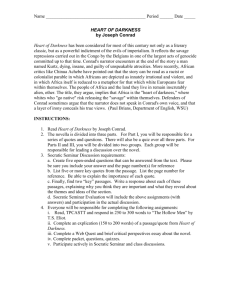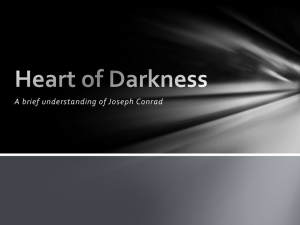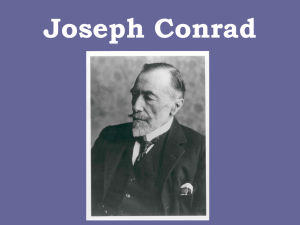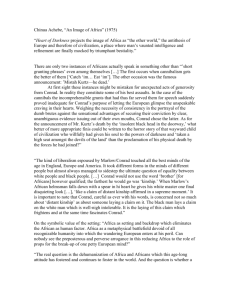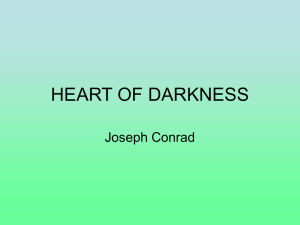In Heart of Darkness
advertisement
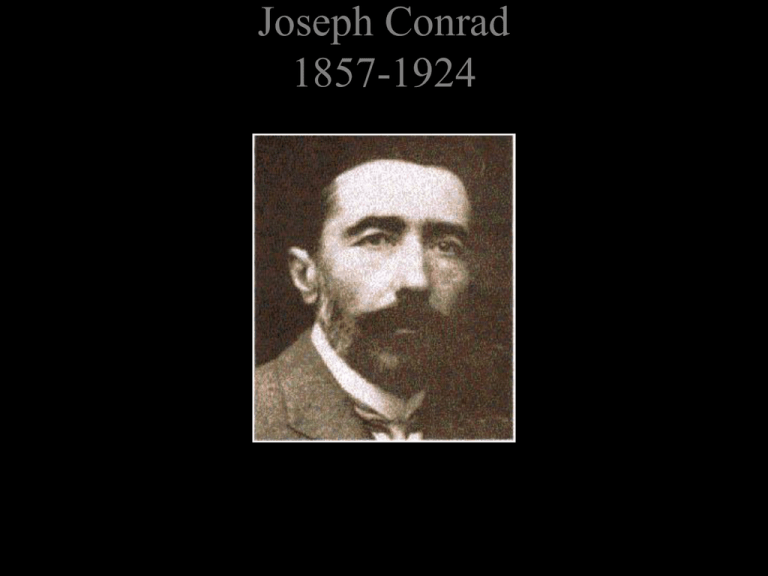
Joseph Conrad 1857-1924 Joseph Conrad 1857-1924 Conrad was born Josef Konrad Nalecz Korzeniowski Joseph Conrad 1857-1924 Conrad was born Josef Konrad Nalecz Korzeniowski Orphaned at 12 years old, educated at Cracow and in Switzerland Joseph Conrad 1857-1924 Conrad was born Josef Konrad Nalecz Korzeniowski Orphaned at 12 years old, educated at Cracow and in Switzerland Ran away to join the French Merchant Navy at 17 Joined the British Merchant Navy just before his 21st birthday Joseph Conrad 1857-1924 Conrad was born Josef Konrad Nalecz Korzeniowski Orphaned at 12 years old, educated at Cracow and in Switzerland Ran away to join the French Merchant Navy at 17 Joined the British Merchant Navy just before his 21st birthday Conrad held a number of assignments as a seaman, and eventually a Captain, during an 18-year career in the British Merchant Navy Joseph Conrad 1857-1924 Conrad was born Josef Konrad Nalecz Korzeniowski Orphaned at 12 years old, educated at Cracow and in Switzerland Ran away to join the French Merchant Navy at 17 Joined the British Merchant Navy just before his 21st birthday Conrad held a number of assignments as a seaman, and eventually a Captain, during an 18-year career in the British Merchant Navy Conrad adopted British citizenship in 1886 Joseph Conrad 1857-1924 Conrad was born Josef Konrad Nalecz Korzeniowski Orphaned at 12 years old, educated at Cracow and in Switzerland Ran away to join the French Merchant Navy at 17 Joined the British Merchant Navy just before his 21st birthday Conrad held a number of assignments as a seaman, and eventually a Captain, during an 18-year career in the British Merchant Navy Conrad adopted British citizenship in 1886 In 1894 he decided to become a writer, and to write in English, rather than French or Polish Joseph Conrad 1857-1924 Conrad was born Josef Konrad Nalecz Korzeniowski Orphaned at 12 years old, educated at Cracow and in Switzerland Ran away to join the French Merchant Navy at 17 Joined the British Merchant Navy just before his 21st birthday Conrad held a number of assignments as a seaman, and eventually a Captain, during an 18-year career in the British Merchant Navy Conrad adopted British citizenship in 1886 In 1894 he decided to become a writer, and to write in English, rather than French or Polish Conrad is seen as a quintessentially “modern” writer Conrad and Modernity Conrad’s themes include critiques of the moral bankruptcy of modernity as revealed in the excesses of capitalist greed and colonial exploitation Conrad and Modernity Conrad’s themes include critiques of the moral bankruptcy of modernity as revealed in the excesses of capitalist greed and colonial exploitation Conrad is not exactly a champion of the exploited, however; his theme is more typically the degrading effect of greed and colonialism upon Europeans Conrad and Modernity Conrad’s themes include critiques of the moral bankruptcy of modernity as revealed in the excesses of capitalist greed and colonial exploitation Conrad is not exactly a champion of the exploited, however; his theme is more typically the degrading effect of greed and colonialism upon Europeans Conrad’s novels, including Heart of Darkness, are structured around mythical cores, especially the hero’s quest Conrad and Modernity Conrad’s themes include critiques of the moral bankruptcy of modernity as revealed in the excesses of capitalist greed and colonial exploitation Conrad is not exactly a champion of the exploited, however; his theme is more typically the degrading effect of greed and colonialism upon Europeans Conrad’s novels, including Heart of Darkness, are structured around mythical cores, especially the hero’s quest In this, they can be compared to Beowulf, Paradise Lost, and even, perhaps, to Gulliver’s Travels Conrad and Modernity Conrad’s themes include critiques of the moral bankruptcy of modernity as revealed in the excesses of capitalist greed and colonial exploitation Conrad is not exactly a champion of the exploited, however; his theme is more typically the degrading effect of greed and colonialism upon Europeans Conrad’s novels, including Heart of Darkness, are structured around mythical cores, especially the hero’s quest In this, they can be compared to Beowulf, Paradise Lost, and even, perhaps, to Gulliver’s Travels In Heart of Darkness, Conrad’s hero, Marlow, is radically alienated from his contemporary European society, but he doesn’t act to change it; this sense of alienation and helplessness in the face of the moral decline is also a characteristic feature of late modern fiction Conrad and Modernity Although Conrad’s narratives clearly stem from his personal experiences, they are not exactly “realist” or autobiographical Conrad and Modernity Although Conrad’s narratives clearly stem from his personal experiences, they are not exactly “realist” or autobiographical Conrad’s style is richly and complexly symbolic Conrad and Modernity Although Conrad’s narratives clearly stem from his personal experiences, they are not exactly “realist” or autobiographical Conrad’s style is richly and complexly symbolic He makes his realistic narrative illuminate the moral and ethical contradictions of modernity that are just coming into historical focus during his lifetime Conrad and Modernity Citing the critic Ian Watt, Kevin Dettmar and Jenifer WIcke, editors of Volume 2c of the Longman Anthology of British Literature, write: [Conrad’s experimentation in works like Heart of Darkness] result from [his] own personal experience, a personal experience of travel, exile, and solitude that was a radical premonition of the conditions of modernity. (Longman Anthology, p. 2136) Conrad and Modernity According to Dettmar and Wicke, Conrad’s style is distinctively “visual” in the way in which he represents shades of meaning through the visual effects of his descriptions: [In Heart of Darkness] events cast a visual glow and haze where meaning can be found only in the most subtle shades and ambiguous highlights of language. The reader must participate in the gradual, and partial, process of accumulating meaning. (Longman Anthology, p. 2137) Conrad and Modernity Dettmar and Wicke cite the following passage, explaining the story-telling technique of Marlow, from Heart of Darkness: The yarns of seamen have a direct simplicity, the whole meaning of which lies within the shell of a cracked nut. But Marlow was not typical (if his propensity to spin yarns be excepted), and to him the meaning of an episode was not inside like a kernel but outside, enveloping the tale which brought it out only as a glow brings out a haze, in the likeness of one of these misty halos that are sometimes made visible by the spectral illumination of moonshine. (Longman Anthology, p. 2137; p. 2142) Heart of Darkness Heart of Darkness is a “framed” narrative—like Canterbury Tales, Utopia, and Gulliver’s Travels Heart of Darkness Heart of Darkness is a “framed” narrative—like Canterbury Tales, Utopia, and Gulliver’s Travels Heart of Darkness also invokes some of the conventions of travel writing, like Utopia and Gulliver’s Travels Heart of Darkness Heart of Darkness is a “framed” narrative—like Canterbury Tales, Utopia, and Gulliver’s Travels Heart of Darkness also invokes some of the conventions of travel writing, like Utopia and Gulliver’s Travels Heart of Darkness begins with a small group of friends—business associates, the narrator of the introduction, a director of a company, an accountant, a lawyer, and Marlow, the seaman—sitting on the deck of a yacht, in the Thames, as the sun sets and fog thickens Heart of Darkness Heart of Darkness is a “framed” narrative—like Canterbury Tales, Utopia, and Gulliver’s Travels Heart of Darkness also invokes some of the conventions of travel writing, like Utopia and Gulliver’s Travels Heart of Darkness begins with a small group of friends—business associates, the narrator of the introduction, a director of a company, an accountant, a lawyer, and Marlow, the seaman—sitting on the deck of a yacht, in the Thames, as the sun sets and fog thickens But the director seems to instill confidence; the narrator says “he resembled a pilot” (p. 2141) Heart of Darkness Heart of Darkness is a “framed” narrative—like Canterbury Tales, Utopia, and Gulliver’s Travels Heart of Darkness also invokes some of the conventions of travel writing, like Utopia and Gulliver’s Travels Heart of Darkness begins with a small group of friends—business associates, the narrator of the introduction, a director of a company, an accountant, a lawyer, and Marlow, the seaman—sitting on the deck of a yacht, in the Thames, as the sun sets and fog thickens But the director seems to instill confidence; the narrator says “he resembled a pilot” (p. 2141) Marlow is the only one of the group who “still follows the sea”; he is the only one who is in touch with the places where the company makes its money (p. 2142) Heart of Darkness The narrator thinks about all of the men and ships that have sailed out from the Thames into the ocean—”the great knights-errant of the sea” (Longman Anthology, 2141) Heart of Darkness The narrator thinks about all of the men and ships that have sailed out from the Thames into the ocean—”the great knights-errant of the sea” He mentions Sir Francis Drake, Captain of the Golden Hind, heroic “privateer” (or pirate) who attached Spanish ships returning from the Americas, stealing their gold and delivering a portion to Queen Elizabeth (Longman Anthology, 2141) Heart of Darkness The narrator thinks about all of the men and ships that have sailed out from the Thames into the ocean—”the great knights-errant of the sea” He mentions Sir Francis Drake, Captain of the Golden Hind, heroic “privateer” (or pirate) who attached Spanish ships returning from the Americas, stealing their gold and delivering a portion to Queen Elizabeth He mentions Sir John Franklin, captain of an expedition in search of the Northwest Passage in 1845—this was a failed mission, Franklin and his crew never returned (Longman Anthology, 2141) Heart of Darkness The narrator thinks about all of the men and ships that have sailed out from the Thames into the ocean—”the great knights-errant of the sea” He mentions Sir Francis Drake, Captain of the Golden Hind, heroic “privateer” (or pirate) who attached Spanish ships returning from the Americas, stealing their gold and delivering a portion to Queen Elizabeth He mentions Sir John Franklin, captain of an expedition in search of the Northwest Passage in 1845—this was a failed mission, Franklin and his crew never returned Note the ambivalent character of these two examples—Drake is a hero, but also a thief; Franklin embarked upon a heroic mission, but the mission was a failure (Longman Anthology, 2141) Heart of Darkness The narrator thinks about all of the men and ships that have sailed out from the Thames into the ocean—”the great knights-errant of the sea” He mentions Sir Francis Drake, Captain of the Golden Hind, heroic “privateer” (or pirate) who attached Spanish ships returning from the Americas, stealing their gold and delivering a portion to Queen Elizabeth He mentions Sir John Franklin, captain of an expedition in search of the Northwest Passage in 1845—this was a failed mission, Franklin and his crew never returned Note the ambivalent character of these two examples—Drake is a hero, but also a thief; Franklin embarked upon a heroic mission, but the mission was a failure Conrad’s narrator seems to be setting a tone of regret and repentance about the driving force of adventure and conquest (Longman Anthology, 2141) Heart of Darkness As the narrator finishes setting the scene, Marlow suddenly speaks: And this also,” said Marlow suddenly, “has been one of the dark places of the earth.” (Longman Anthology, 2141) Marlow is referring to the experience of the Roman invaders, sent in A.D. 43 to take control of Britain, sailing up the Thames into what must have seemed like a wild, uncivilized place—cold, gray, dark—the opposite of the sun-drenched Mediterranean Heart of Darkness “Imagine the feelings of a commander of a fine . . . trireme in the Mediterranean, ordered suddenly to the north; run overland across the Gauls in a hurry . . . . Imagine him here—the very end of the world, a sea the colour of lead, a sky the colour of smoke, a kind of ship about as rigid as a concertina—and going up this river with stores, or orders, or what yo like. Sandbanks, marshes, forests, savages—precious little to eat fit for a civilized man, nothing by Thames water to drink. . . . Here and there a military camp lost in a wilderness, like a needle in a bundle of hay—cold, fog, tempests, disease, exile, and death,--deth skuli\king in the air, in the water, in the bush. . . . Land in a swamp, march through the woods, and in some inland post feel the savagery, the utter savagery, had closed round him,--all that mysterious life of the wilderness that stirs in the forest, in the jungles, in the hearts of wild men. There’s no initiation either into such mysteries. He has to live in the midst of the incomprehensible, which is also detestable. And it has a fascination, too, that goes to work upon him. The fascination of the aboniation—you know. Imagine the growing regrets, the longing to escape, the powerless disgust, the surrender, the hate.” (Longman Anthology, 2141)
